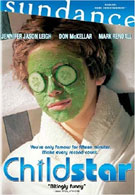Several weeks ago I referred to a film from over twenty years ago being proof of the name “Sundance” and “pretentious” being pretty much interchangeable. While that DVD happened to prove my point, Childstar proves that not everything Sundance releases has to be pretentious, and that over time the festival/television channel has brought some pretty interesting films to light. We’re all familiar with the idea of the stereotypical child star. You know the type, the stuck up, spoiled rotten, found success at the age of ten but will be burned out on coke by the time he reaches fifteen celebrity? That concept has been the subject of plot devices from Pee Wee’s Big Adventure to Bravo Channel’s “Showbiz Moms & Dads”. Don McKellar’s Childstar uses that stereotype to its advantage, creating a touching story told from an interesting vantage point.
McKellar plays Rick, a former university professor turned freelance director who, as most people who leave stability for art tend to do, is making ends meet with a less than idealistic job. In this case Rick serves as a driver, hired by an American studio that is trying to crank out a film in Canada quickly to take advantage of the popularity of twelve year old star Taylor Brandon Burns (Mark Rendall). From Rick’s vantage point we get to see the snob that Taylor has been raised to be, from the studio panderings to Taylor’s mother Suzanne, who uses Taylor’s position to get what she wants “for the benefit of her son”. Odd things seem to be to Taylor’s benefit, like schtupping Rick the driver, which happens on the first day Rick and Suzanne meet.
Unlike other movies where the child star learns the error of his ways, Childstar offers us an interesting vantage point through Rick’s eyes. We see that Taylor really isn’t a bad kid, he’s just a product of his environment. People cater to him, so he expects others to do so. Unfortunately beneath that privileged façade is a twelve year old boy who is going through all the stuff that happens at that age. He thinks he should be doing better with the ladies, which isn’t helped when he goes out partying with one of his co-stars and winds up with aspiring actress/model Natalie (Kristin Adams), another person in Taylor’s life who wants to use him, just like his studios and parents. In fact, the only person who doesn’t seem out to use Taylor is Rick, who could easily attempt to get his director career going through Taylor, but never seems interested in taking that road. Of all people, the simple driver seems to be the one most interested in Taylor as a person, not as a child star.
What works best about Childstar is that it doesn’t try and clean everything up for a Hollywood ending. If anything, the more Rick reaches out to Taylor, the more screwed up the kid proves to be. Just when you think Rick is making some sort of connection, Taylor runs away with his new found friend Natalie, and from there things really get screwy. There’s nothing like a missing child to show the true priorities of all of those who were catering to the star. Studios are concerned with the money they are losing to their lost shooting schedule, and Suzanne wonders if Taylor’s absence isn’t an excellent time to renegotiate his contract. Jennifer Jason Leigh truly excels in showing the complex conflict of Suzanne, a mother who wants what is best for her child, even if she’s not quite sure what that is. It just goes to show, success doesn’t always just screw up those directly involved
My favorite part of the film, however, is one that might not even have been totally intentional. As a Canadian film, it brings a neat perspective to all the American films that use Canada as a filming location. As the movie within the movie starts to fall apart, studio executives lose their cool. Suddenly the already intense on-site producer (Dave Foley) is totally spazzing out, but that doesn’t come close to the boardroom studio exec (Gil Bellows) that starts mysteriously appearing and tossing out movie gangster type threats and situations. You have to wonder, do people who live in a world of movies actually fall apart like this, resorting to movie clichés to try and make their point? The whole deconstruction is almost a giant middle finger to the American filmmaking system for ever coming over the border to film, and it makes me wonder what experiences McKellar, as an independent filmmaker, has gone through to portray executives in this light.
As writer, director, and actor, Don McKellar brings an interesting touch to the story of a child star. His characters may not be unique, but the provide an interesting enough vantage point that what could have been a rehashed story feels like it’s being told from a new perspective. If nothing else, by using an odd array of actors like Alan Thicke and Eric Stoltz, what could have been a pretentious indie flick could earn a cult status among fans. After the disappointing technical issues I encountered with my last Sundance Channel Home Entertainment release (Under Milk Wood), I feared the worst putting this DVD in my player. Fortunately I can say it seems to be free of the issues that plagued the last release. The menus and disc navigation are all very intuitive and exactly what I’d expect for a professional DVD release, with the exception of the commentary track not listed under bonus material, but under “setup” (not a rare thing for DVD releases). Maybe this is because Childstar has less in the bonus materials category, or maybe the DVD designers just figured out what they were doing.
Included is the theatrical trailer, for which Childstar gets a huge hurrah. We’ve gotten to a point where we’re accepting trailers being left out again, because I see it mentioned less and less in reviews from both us and others. Especially in this film’s case it’s a good thing, because it’s highly likely few people have seen the trailer.
Your Daily Blend of Entertainment News
The commentary track includes McKellar, and editor Reginald Harkema. Also included is an interesting twist to the commentary concept – composer Christopher Dedrick joins in not to really add comment, but to play music in the background from time to time with his acoustic guitar. When McKellar first announced that I thought, “What a genius idea”. Unfortunately, while it is a good idea, it didn’t really work in execution. Dedrick only chimes in a few times with musical cues, most of which last less than fifteen to twenty seconds. Maybe with some better planning in advance though this could be a very cool concept; instead McKellar and Harkema rattle on about the picture, answering very few of the questions the viewer might have hoped to have explained. McKellar leaves a lot of things unanswered in the film, with several jumps in characters that didn’t bother me, but I would like to have understood his reasoning behind. Instead we get tidbits like Rick’s soul patch being representative of the character’s pretentiousness as a filmmaker. Hmmm… with commentary like that maybe it’s not just the character.
Finally there is a short making-of featurette, documenting some of the issues and excitement behind making the movie. While it goes more into detail about the making of the film then the commentary track, it is just a highlight of certain elements of the movie. Of the most interest is probably the comparison of Mark Rendall with his character, the titular Childstar. McKellar also offers some of his ideas on filmmaking and acting, which actually don’t sound very different from mainstream directors I’ve heard comment on the same things. Maybe this is proof the only real difference between independent filmmakers and mainstream ones are budgetary.
Childstar is an interesting enough film that I would recommend it for a rental even if you’ve never heard of it before. Before checking it out though, be aware it is a Canadian independent film that leaves some aspects of the movie open to the viewer to figure out. Damn Canadians… always making us work for our entertainment.

